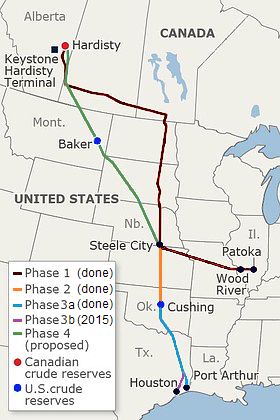By now we’ve all heard about the Keystone XL Pipeline, the remarkable 1700 mile channel that will carry and direct tar sands crude oil from Alberta, Canada to American refineries in the Gulf States. Everyone seems to have an opinion and to most citizens, all seem plausible. Surely, no one would argue that the pipeline would pos itively impact the economy and create over 100,000 jobs. Because there is evidence that the pipeline will also facilitate significant expansion in the production and distribution of natural gas resources, supporters believe any excess gas can enable us to supply many of our allies thus reducing their dependence on Russia and the Mid-East.
itively impact the economy and create over 100,000 jobs. Because there is evidence that the pipeline will also facilitate significant expansion in the production and distribution of natural gas resources, supporters believe any excess gas can enable us to supply many of our allies thus reducing their dependence on Russia and the Mid-East.
On the surface it appears to be a no brainer, but on November 3, the present administration again decided to withhold its decision on the pipeline until after the mid-term elections. Although many Americans cannot understand the delay, particularly in light of increased employment opportunities the project would create, there are serious environmental repercussions to consider. Amazingly, ardent opponents include members of some of the largest unions in the country. Even the AFL-CIO has maintained their silence regarding supporting the project.
As an ecology-driven company, it is difficult for us to support the transport of tar sands crude via the Keystone XL pipeline. Simply put, it is a dirty energy venture, (actually tar sands are known as the “dirtiest source of fuel on the planet”) proven to have a disastrous effect on climate change by worsening carbon pollution. The Gulf Coast has already experienced devastating contamination of its waters more than once. The pipeline will only serve to heighten the possibility of further damage to all life forms in the region, as pipelines such as these have an increased risk of oil spills. In addition, the route of the pipeline would take it directly across Nebraska’s pristine Ogallala Aquifer. Nebraska is among our nation’s most vital agricultural states. If an oil spill were to contaminate that aquifer, the results would prove nothing short of devastating to the farming industry.
As opponents of the pipeline we have also taken into consideration the damage that would be incurred during the extraction of tar sands crude. The process would literally destroy what is left of the cultural heritage homeland of countless native peoples of Canada known as First Nation. Alberta’s tar sands are located beneath a section of the Boreal Forest and wetlands, an ecosystem with great spiritual meaning to First Nation population. Extraction of product would require strip-mining or pumping. The pumping process necessitates initiating subterranean melting through heat-generated steam. After several months of steaming the unrefined product, known as bitumen, could be pumped upward. The toxins that will undoubtedly accumulate as a result if the extraction will not only destroy the Boreal forest itself but also the nesting migratory birds and various specious of indigenous plant and animal life within it.
Aside from freeing ourselves from dependence on foreign oil, there is no justifiable reason to move forward with the Keystone XL Pipeline. No matter what the outcome of any election…our money…our ingenuity…our collective consciousness should be dedicated to seeking clean energy alternatives, saving and extending lives and showing some shred of respect for a planet that has given us so much.




